democracynow.org
Stories:

In Hiroshima Obama Calls for World Without Nukes, Contradicting New $1 Trillion Weapon Upgrade Plan
Image Credit: Reuters
President Obama has become the first sitting U.S. president to visit the Japanese city of Hiroshima since U.S. warplanes dropped the first atomic bomb on August 6, 1945. The bombing killed 140,000 people and seriously injured another 100,000. Three days later, the U.S. dropped a second atomic bomb on Nagasaki, killing another 74,000 people. Speaking at the Hiroshima Peace Memorial Park, Obama offered no apology for the bombings but called for a world without nuclear weapons. "Among those nations like my own that own nuclear stockpiles, we must have the courage to escape the logic of fear and pursue a world without them," Obama said. Despite his call for an end to nuclear weapons, the United States has been quietly upgrading its nuclear arsenal to create smaller, more precise nuclear bombs as part of a massive effort that will cost up to $1 trillion over three decades. We speak to Pulitzer Prize-winning historian Kai Bird, co-author of "American Prometheus: The Triumph and Tragedy of J. Robert Oppenheimer."
TRANSCRIPT
This is a rush transcript. Copy may not be in its final form.
AMY GOODMAN: This is Democracy Now!, democracynow.org, The War and Peace Report, as we turn to global news about Japan and the United States. Juan?
JUAN GONZÁLEZ: Well, President Obama has become the first sitting U.S. president to visit the Japanese city of Hiroshima since U.S. warplanes dropped the first atomic bomb on August 6, 1945. The bombing killed 140,000 people; another 100,000 were seriously injured. Three days later, the U.S. dropped a second atomic bomb on Nagasaki, killing another 74,000 people. Obama spoke today at the Hiroshima Peace Memorial Park, but offered no apology for the bombings.
PRESIDENT BARACK OBAMA: On a bright, cloudless morning, death fell from the sky, and the world was changed. A flash of light and a wall of fire destroyed a city and demonstrated that mankind possessed the means to destroy itself. Why do we come to this place, to Hiroshima? We come to ponder a terrible force unleashed in the not-so-distant past. We come to mourn the dead, including over 100,000 Japanese men, women and children, thousands of Koreans, a dozen Americans held prisoner. Their souls speak to us. They ask us to look inward, to take stock of who we are.
AMY GOODMAN: Speaking in Hiroshima, President Obama went on to call for a world without nuclear weapons.
PRESIDENT BARACK OBAMA: We may not be able to eliminate man’s capacity to do evil. So nations and the alliances that we formed must possess the means to defend ourselves. But among those nations like my own that hold nuclear stockpiles, we must have the courage to escape the logic of fear and pursue a world without them. We may not realize this goal in my lifetime, but persistent effort can roll back the possibility of catastrophe. We can chart a course that leads to the destruction of these stockpiles. We can stop the spread to new nations and secure deadly materials from fanatics. And yet, that is not enough, for we see around the world today how even the crudest rifles and barrel bombs can serve up violence on a terrible scale. We must change our mindset about war itself.
AMY GOODMAN: Despite President Obama’s call for an end to nuclear weapons, a new study by the Federation of American Scientists has determined the Obama administration has reduced the nuclear stockpile at a far slower rate than any of his three immediate predecessors, including George W. Bush and George H.W. Bush. In addition, the United States has been quietly upgrading its nuclear arsenal to create smaller, more precise nuclear bombs as part of a massive effort that will cost up to $1 trillion over three decades.
To talk more about President Obama’s visit to Hiroshima, we’re joined by Kai Bird, the Pulitzer Prize-winning historian and journalist, co-author of the book American Prometheus: The Triumph and Tragedy of J. Robert Oppenheimer.
Kai, thanks so much for being with us from Miami. Start off by responding to this historic trip, President Obama the first sitting U.S. president to go to Hiroshima. President Carter did, but that was after he was president.
KAI BIRD: Well, thank you, Amy. I’m very glad to be here on your show. And I’m actually quite excited that Obama made this decision to go to Hiroshima. It’s really an extraordinary thing for an American president to go to this site. And while he offered no apology, his presence there, his mere presence in Hiroshima, is an implicit acknowledgment that something terrible happened. And, yes, he is a very complicated and contradictory president. And he’s radical in some ways. He calls for a nuclear-free world. And on the other hand, as you just pointed out, he can—in his presidency of more than seven years now, he has reduced the number of U.S. nuclear warheads by about 13 percent. And many of us think, you know, we need far fewer than the 4,500 warheads we have today. And, yes, he’s engaged in a modernization program that is going to be very expensive and dangerous. So, he’s a very contradictory president. But going to Hiroshima and speaking the words that he spoke today is a real step forward to try to emphasize the danger of these weapons.
JUAN GONZÁLEZ: Well, I wanted to ask you about that speech, and I really encourage people to read the text of the speech, the full text, because it really seems to me one of the most eloquent speeches he’s ever given. It’s almost as if he’s deciding, in his final months in office, he’s got to have a Gettysburg-like speech to take down in history, because it really does talk about the dilemma of war throughout civilization, but at the same time, as we’re saying, there’s this enormous contradiction between the words and the actual actions.
KAI BIRD: Exactly. You know, he’s a very cautious president in some ways, very pragmatic, and yet always eloquent in these situations. He understands the symbolism here. His instincts, I think, are correct. But he understands, as a pragmatic politician, that you wade into this issue with great caution as a U.S. president, because it’s such a hot button. Even 71 years after we obliterated Hiroshima with one bomb, the notion that we should apologize, the notion that it was a bad decision, is still extremely controversial.
You know, more than 20 years ago, I was involved in this horrendous debate over the Enola Gay exhibit at the Smithsonian, which, you know, just harshly divided the country. And yet, that exhibit, I’m still wounded by what happened there. Four million Americans went and saw that exhibit, and it was filled with lies. It was censored. You know, real history—you know, they censored the words of, for instance, President Dwight Eisenhower, who was a critic himself of the decision to use the bomb on Hiroshima. And yet, at the time, the American Legion and the Air Force Association had such political power that they could force our National Museum to censor Eisenhower’s own words in an exhibit.
So this is a very hot-button issue. And so, we—you know, for that reason, I’m encouraged that Obama went to Hiroshima and spoke eloquently about the nature of these weapons of mass destruction and what they can do.
JUAN GONZÁLEZ: Well, in terms of that, the whole issue of the lies, the main myth that you have tried to unmask or expose is that if not for the dropping of the bomb, the war would have continued, that the bombs ended World War II, at least in terms of the fight with the Japanese.
KAI BIRD: Right. And, you know, Obama, when he was about to go to Hiroshima, he said, "I’m not going to offer an apology." He was very explicit about that. He said, "That is—that historical incident, that—what happened in Hiroshima, the decision to use the bomb, I will leave that for the historians." Well, you know, 70 years later, the historical consensus, looking at the documents and all the evidence from both sides, has really shifted enormously. And we now understand that the decision to use the bomb on Hiroshima was a redundant thing. It was not necessary. What really persuaded the Japanese emperor and the military generals around him to surrender was the entry into the war of the Soviet Union. They feared the Bolsheviks invading the Japanese home islands. And that’s really—that was the tipping point. So the bomb was redundant and, ultimately, unnecessary.
And by using it, though, we legitimized the use of nuclear weapons. And by legitimizing nuclear weapons, we made ourselves, for the last 50 years, 70 years, extremely vulnerable. And we are very lucky that these weapons have not been used on a third occasion in anger. And people forget that the father of the atomic bomb, J. Robert Oppenheimer, within three months of Hiroshima, was saying things like, "If we continue to go down this road and rely on nuclear weapons and they are used again someday in war, people will curse the names of Hiroshima and Nagasaki." And so we’re still living with that threat.
AMY GOODMAN: And that issue of this dropping of the—a second atomic bomb three days later, after 140,000 people were killed in Hiroshima, 100,000 wounded, on August 6, August 9, 1945, dropping that second bomb, Kai Bird?
KAI BIRD: Well, yeah, there’s enormous controversy over that, too. Why the second bomb, and so quickly after Hiroshima? Well, one of the answers is that Harry Truman, the president at the time, didn’t even know that a second bomb was going to be used so quickly. He had given his acquiescence to the use of the bomb. It was General Groves, who was in charge of the Manhattan Project, who decided on the timetable. And Hiroshima happened on August 6, and they wanted—Groves wanted to use the second bomb, which was a different—a technically different bomb. So there were two different types of bombs, and he wanted to, in effect, test both. And, you know, three days was not enough for the Japanese emperor and the military establishment there to respond. They had no idea really what had happened in Hiroshima. It took them days to absorb the news and fathom what had happened. And, in fact, you know, their decision to surrender came when the Soviets entered the war just a few days later. That was the tipping point.
JUAN GONZÁLEZ: And briefly, if you could tell us the enormous regret that Oppenheimer, the father of the bomb, had about what his invention had led to?
KAI BIRD: Well, Oppenheimer was a very complicated man, and he himself never, quote, "apologized" for the bomb. He never apologized for quantum physics, for his role in inventing the bomb. He thought that this science was inevitable, the scientific journey of discovery to understand our world, our physical world, was inevitable, and that what he did was, you know, inevitable and a part of the human journey of self-knowledge. But he very quickly—you know, again, within months of Hiroshima, he was giving speeches, which shook the military establishment in Washington, saying things like, you know, this bomb was used on an essentially already defeated enemy. Now, you think about that. That’s a very striking thing for the father of the atomic bomb to acknowledge, just within months of Hiroshima and Nagasaki, that the bomb was used on an essentially defeated enemy.
AMY GOODMAN: And—
KAI BIRD: So he was acknowledging there that it was not necessary.
AMY GOODMAN: And, Kai Bird, his famous quoting of the Bhagavad Gita, "I am become Death, the shatterer of worlds"?
KAI BIRD: Yes, well, Oppie—that was his nickname—you know, he was a polymath. He studied quantum physics, but he also loved French poetry, and he also loved the Hindu Gita. He learned Sanskrit so that he could learn it—read it in the original. And so, a few weeks after Hiroshima, when a New York Times reporter asked him what he had thought—and I think they caught this on camera, too—the words popped into his head from the Gita: "I am Death, destroyer of worlds." And so, he will be forever remembered with that phrase from the Gita.
AMY GOODMAN: I want to thank you very much, Kai Bird, for being with us, Pulitzer Prize-winning historian, journalist, co-author of the book American Prometheus: The Triumph and Tragedy of J. Robert Oppenheimer. Go to our website at democracynow.org, when we broadcast from Japan several years ago and went to Hiroshima, taken around by a Hiroshima survivor. When we come back from break, we’ll be joined by yet another survivor, Setsuko Thurlow, a survivor of the Hiroshima bombing. Stay with us. ... Read More →

A Colonial Takeover: Proposed Puerto Rican Debt Bill to Give "Dictatorial Powers" to Unelected Board
Juan González discusses a proposed bill backed by the Obama administration and congressional leaders that would create a new bankruptcy-type process specifically tailored for Puerto Rico. A House committee voted in favor of the Puerto Rico Oversight, Management and Economic Stability Act earlier this week. On the presidential trail, Hillary Clinton has backed the measure, while Bernie Sanders has opposed it. "The bill has provoked a furor among many island residents because it imposes a seven-member oversight board with dictatorial powers that harken back to colonial days, and because it is geared to protecting bondholders and paving the way for massive cuts in the island’s public services," González writes in his column in the New York Daily News.
TRANSCRIPT
This is a rush transcript. Copy may not be in its final form.
AMY GOODMAN: So, Juan, you have a new piece out in the New York Daily News, which you retired from but are continuing to write columns for.
JUAN GONZÁLEZ: On occasion, not on a regular basis.
AMY GOODMAN: That’s called "Puerto Rico faces 'wholesale' colonial-style takeover to ease $2B debt." Can you talk about this?
JUAN GONZÁLEZ: Yes. Well, as we’ve discussed here on the show several times, the—Puerto Rico has been asking for nearly a year now for Congress to give it legal authority to be able to restructure about $72 billion in debt that the government of Puerto Rico has said it cannot pay. So, finally, after months and months of wrangling and negotiations between Democrats and Republicans and the Obama administration, on Wednesday the House Natural Resources Committee, by a vote of 29 to 10, a bipartisan vote, did finally pass a bill that will now go to the full House, and then, if it passes there, to the Senate.
And that bill does have a restructuring mechanism in it for Puerto Rico, but it’s now really a poison pill, because in addition to providing the restructuring that the government of Puerto Rico has asked for, it’s also requiring the government of Puerto Rico to submit to a virtual total takeover of its economy. It would require a new oversight board of seven people, four of whom will be chosen basically by the Republicans; even though they will be appointed by the president, the president has to take them from lists provided by Speaker Ryan and by the Senate majority leader. So it’s basically going to be a Republican-dominated board. And most importantly—this is what rankles most people on the island—is that only one of the seven actually has to be a resident or have a primary business in Puerto Rico. So you’re in essence creating a board, an oversight—a control board that will be of nonresidents of the island running the financial affairs of Puerto Rico for the next five, possibly 10 years.
AMY GOODMAN: Is the model for this—I mean, is this similar to Washington, D.C.?
JUAN GONZÁLEZ: It’s similar, but much more tougher. In fact, there was a memo that the Republican leadership provided to the hearing on Wednesday that said that this was—that boasted that if Puerto Rico’s government "fails to comply with the fiscal plan" that the board approves, the board "may impose mandatory cuts ... a power far beyond that exercised by the Control Board established [for] the District of Columbia." So, the Republicans are boasting that this is much tougher than the District of Columbia’s control board. And, more importantly, in the District of Columbia, all five residents of the control—all five members of the control board had to be residents of the District of Columbia. This is an outside board now—and this outside board will control not only the finances. Any new laws that are passed have to be approved by the control board. Any capital investments on the island have to be approved by the control board.
AMY GOODMAN: I mean, it sounds—
JUAN GONZÁLEZ: It’s a complete takeover of the island’s economy.
AMY GOODMAN: Is it also a model for this somewhat, the unelected city managers that Michigan Governor Rick Snyder appoints, in charge of places like Flint?
JUAN GONZÁLEZ: Yes, but with this one big difference. The governor of—the governor of Michigan did have the power, under the laws that existed, to do that. Puerto Rico supposedly is a self-governing territory, that was granted self-government by Congress back in the 1950s. And so, this is a situation not just of a state imposing itself on a city, but of one nation imposing colonial control on another nation. And so, this is the problem that has really rankled folks. And now it’s become part of the presidential race, because Bernie Sanders obviously has come out strongly opposed to the bill. Today, Sanders is supposed to be having a conference call with Puerto Rican leaders to discuss possibly presenting an alternative bill in the Senate. And this bill still has to be voted on by the full House next week, and then it will have to be considered by the Senate. There are several senators—Bob Menendez, Dick Durbin and Sanders—who have come out against it. Any one of them could filibuster the bill.
AMY GOODMAN: So let’s go to Sanders for a minute. The Democratic primary in Puerto Rico is June 5th. Sanders says Puerto Rico’s $70 billion debt must be restructured in a way that does not deepen its economic crisis.
SEN. BERNIE SANDERS: It is unacceptable to me that vulture funds on Wall Street are demanding that Puerto Rico fire teachers, close schools, cut pensions and abolish the minimum wage, so that they can reap huge profits off the suffering and the misery of the children and the people of Puerto Rico. We cannot allow that to happen. We will not allow that to happen.
AMY GOODMAN: So, that’s Democratic presidential candidate Bernie Sanders. What is Hillary Clinton’s view on this?
JUAN GONZÁLEZ: Well, Hillary Clinton recognized that there are problems with the bill, but she supports it, as does the Obama administration, as does Representative Nydia Velázquez, who’s been a strong advocate of Puerto Rico, because what they see—
AMY GOODMAN: Nydia Velázquez is Puerto Rican.
JUAN GONZÁLEZ: Yes, but she and all of those supporters in the Democratic Party, their argument is, "Look, this is the best possible deal that you’re going to be able to get, that Puerto Rico will be able to get, under a Republican-controlled Congress. It’s either this or nothing." And because there’s a $2 billion debt payment due on July 1 that Puerto Rico cannot pay, the total rush to the courthouse of all the creditors will begin July 2nd. So they’re saying, "There’s no time to be able to do anything different. We’ve got to swallow this poison pill." There are others who say, "No, don’t pay the debt on July 1, and let the legal battle continue to play out and, of course, still wait for a Supreme Court decision on this issue." So, we won’t—we won’t know what’s going to happen, but the first thing right now that could happen is that there will be a House vote a week after next when Congress comes back into session, and then the Senate will consider it in late June. So this is an ongoing story.
AMY GOODMAN: And, of course, we’ll continue to cover it, and we will link to your piece in the New York Daily News, that you retired from but are continuing to write columns for, that is called Puerto Rico faces 'wholesale' colonial-style takeover to ease $2B debt." We’ll link to it at democracynow.org.
When we come back, we go to Chicago to a young activist who is threatened with deportation, she says, because she was exercising her freedom of speech. Stay with us. ... Read More →

"Civil Disobedience is Survival": Ireri Carrasco Sues Obama Admin for Denying Her DACA over Protests
In Chicago, a migrant justice activist is suing the Department of Homeland Security for refusing to renew her DACA protection because of her activism. Twenty-nine-year-old Ireri Unzueta Carrasco received Deferred Action for Childhood Arrivals status in 2013. DACA is the Obama administration’s program shielding some undocumented people brought to the U.S. as children from deportation if they meet certain conditions. Even though Unzueta Carrasco says she met those conditions, the Department of Homeland Security denied her DACA renewal because of her participation in acts of civil disobedience aimed at pressuring the Obama administration to halt its record deportations. We’re joined by Ireri Unzueta Carrasco.
TRANSCRIPT
This is a rush transcript. Copy may not be in its final form.
JUAN GONZÁLEZ: We turn now to the story of a migrant justice activist who is suing the Department of Homeland Security for refusing to renew her DACA protection because of her activism. Twenty-nine-year-old Ireri Unzueta Carrasco received Deferred Action for Childhood Arrivals status in 2013. DACA is the Obama administration’s program shielding some undocumented people brought to the United States as children from deportation if they meet certain conditions. Even though Unzueta Carrasco says she met those conditions, the Department of Homeland Security denied her DACA renewal because of her participation in acts of civil disobedience aimed at pressuring the Obama administration to halt its record deportations. Such protests helped propel President Obama to institute the DACA program in the first place.
AMY GOODMAN: In a statement sent to her attorney in March, U.S. Citizenship and Immigration Services said Unzueta Carrasco’s participation in peaceful acts of civil disobedience constituted a threat to public safety. In one of the protests cited by authorities, she was one of 10 undocumented people arrested in September 2012 during an act of civil disobedience at the Democratic National Convention in Charlotte. Democracy Now! was there when the activists rode into uptown Charlotte, North Carolina, aboard the "No Papers, No Fear" bus, called the "UndocuBus," which had been traveling for six weeks across the country from Arizona to protest Obama’s immigration policies. They sat down at a busy intersection directly in front of the arena where the DNC was about to be gaveled open, blocking traffic. Ireri was arrested alongside her mom and her dad. Democracy Now!’s Mike Burke was there and interviewed her while she was being arrested.
IRERI UNZUETA CARRASCO: I’m tired of being undocumented. I’m tired of losing opportunity.
MIKE BURKE: What does it mean that you’re getting arrested right now, for you?
IRERI UNZUETA CARRASCO: Because the police and ICE collaborate every day, we’re making this public. We’re hoping to show the community that they can organize themselves and to bring this message to President Obama for him to actually listen.
MIKE BURKE: Could you face deportation now that you’re getting arrested?
IRERI UNZUETA CARRASCO: I don’t know yet. That’s going to be up to immigration and the sheriff. But I’m willing to risk it.
MIKE BURKE: Anything else you’d like to add?
IRERI UNZUETA CARRASCO: I am proud to be doing this with my parents.
ROSI CARRASCO: We’re risking arrest because we are fighting for our rights, our right to organize, our right to be with our families. We want President Obama to stop deportation.
JUAN GONZÁLEZ: That last voice was Rosi Carrasco, the mother of Ireri, and—who is now suing the Department of Homeland Security for refusing to renew her DACA protection due to her participation in that protest and other acts of civil disobedience. More than a hundred civil and immigrant rights groups have signed onto a letter to DHS Secretary Jeh Johnson calling on the agency to renew her DACA status and protect the constitutional right to political expression.
AMY GOODMAN: We invited the Department of Homeland Security to join us on the program today, but they declined, writing, quote, "As a matter of policy we don’t comment on pending litigation. Furthermore, due to privacy constraints, we cannot comment on individual cases [of] applications," they said. Well, Ireri Unzueta Carrasco joins us now from Chicago, along with her attorney, Mony Ruiz-Velasco.
We welcome you both to Democracy Now! Ireri, tell us what happened. How is it you got DACA status? And what has happened to it?
IRERI UNZUETA CARRASCO: Good morning, and thank you for having us here. I originally applied for the Deferred Action for Childhood Arrivals in 2013, and I was able to get it. And when I tried to renew, like you mentioned, it was denied, based—and the response that we got from the ombudsman was that because of my participation of civil disobedience, this was something that they weren’t going to renew. And so, after this long process of trying to figure out what was going on, we decided that we needed to go public about what was happening with my case, so that the Department of Homeland Security and USCIS could know that any time that they try to do—they try to do something that’s unjust with our community, we’re going to stand up. For me, civil disobedience is an act of survival. It’s something that we do to defend our communities. And it’s important that we defend our right to continue expressing ourselves politically and be able to organize to defend our communities.
JUAN GONZÁLEZ: And, Mony Ruiz-Velasco, what’s the significance of this case? Have there been others like this across the country, or is this really a possible trendsetting case? What’s the legal basis for the department being able to do this?
MONY RUIZ-VELASCO: Well, we believe there is no legal basis for the department to be able to do this, which is why we filed a lawsuit along with our partners at the National Immigrant Justice Center. Ireri was unfortunately denied, then the government stated that they believed she was a public safety risk. And we believe that is an incorrect decision. There’s a specific definition of what it means to be a public safety risk, and Ireri clearly does not fit within any realm of possibility of that opinion and of that legal definition. And we believe this case is unique at this point, but as Ireri mentioned, we want to make sure that this is not happening to anyone else, that if the administration intends to punish activists, like Ireri and like her family and like many others across the country, that we are not going to stand for that, and we’re going to continue to organize in every way that we can with the community, in—through using legal fronts, as well. So that’s why we’re here today.
JUAN GONZÁLEZ: Now, in this case, in particular, they cite four arrests, but for none of these arrests was she actually convicted of any crime, right?
MONY RUIZ-VELASCO: That’s correct. She was not charged or convicted of any crime.
AMY GOODMAN: You know, I remember so clearly that day, that first day of the Democratic convention in Charlotte. It was pouring rain. Ireri, you all came pouring out of the UndocuBus, your mother leading the way, Rosi Carrasco. We had had her on the show that morning. And then your father came off the bus, who is undocumented, and said, "I am undocumented. I’ve been living here for 18 years. I pay taxes, and I’m paying more taxes than Citibank." With that, you all marched to the front of the convention center, and you got arrested along with a number of others. Now, I wanted to ask you, Ireri, what your parents’ reaction is to your denial of DACA, and what this means for you right now?
IRERI UNZUETA CARRASCO: My parents were very angry when we first found out of the denial last year. And then, when we got the response this year, my mom was actually the one who had said that the reason why I was being denied was probably this form of retaliation. And when we actually got the confirmation, it was just like, OK, it’s time to act. Right? We can’t let this happen to anybody, because when I lost my work permit, I also lost some work opportunities, and I also lost the right that we had won to try to get the—the advance parole. And so, one thing that, for me—that really kind of hurts me is that when I lost the advance parole, it’s also when my grandparents got really sick. And, unfortunately, my grandmother passed away. And shortly after, two weeks after, my grandfather did, as well. And so, for me, that’s kind of like one of the biggest pieces, right? Like, every human being should have the right to work, does have the right to work, and should have the right to see their family members when their family members are sick, without having to fear being banned from the U.S. or anything like that. And so, that has really been the biggest impact on my life. And that’s something—and that’s one of the reasons why we’re doing this, because this shouldn’t happen to anybody.
JUAN GONZÁLEZ: And in terms of the—what it has meant to you to have that period of time under DACA where you had some deferred action, because you—obviously, you came here as a child, you were undocumented for many years, and now you’re in that situation again. What did that period of respite mean for you?
IRERI UNZUETA CARRASCO: Well, it allowed me to apply for certain job opportunities that I didn’t have before. And it was a confusing mix of feelings, because I had been qualified for these jobs before, as well, but I just didn’t have the work permit to be able to do them. And so it did open up a set of opportunities. And now that I no longer have it, like you said, it’s like going back to where I was before. But I have been living in this country for a long time and working here for a long time, even before I had the work permit, and I’ve been able to survive and find ways to get around the obstacles as an undocumented person. So, in that sense, I’m going to continue to work to create opportunities for people, whether or not they have work permits, because I do think that the right to work is an intrinsic human right.
AMY GOODMAN: Well, I want to thank you both for being with us. Ireri Unzueta Carrasco, member of Organized Communities Against Deportation, she’s suing the Department of Homeland Security for refusing to renew her DACA, or Deferred Action for Childhood Arrivals, because of her participation in civil disobedience calling for an end to deportations. And Mony Ruiz-Velasco, thanks so much for being with us, Ireri’s attorney. ... Read More →

"We Learned to Step over the Dead": Hiroshima Survivor & Anti-Nuclear Activist Recalls U.S. Bombing
As President Obama becomes the first sitting U.S. president to visit the city of Hiroshima, we look back at the devastation caused by the U.S. bombing on August 6, 1945. It was the first time a nuclear bomb had been dropped in history. At the time, Setsuko Thurlow was a 13-year-old student at the girls’ school. At 8 a.m. that morning, she was on the second floor of the school’s building, about one mile away from the site that was about to become ground zero. She recalls seeing a bluish white flash through the window. Moments later, she was falling through the air as the building was flattened by the blast. For the rest of her life, Setsuko has organized against nuclear weapons. We’re joined now by Setsuko herself.
TRANSCRIPT
This is a rush transcript. Copy may not be in its final form.
JUAN GONZÁLEZ: President Obama has become the first sitting U.S. president to visit the Japanese city of Hiroshima since U.S. warplanes dropped the first atomic bomb on August 6, 1945. The bombing killed 140,000 people, and another 100,000 were seriously injured. He spoke today at the Hiroshima Peace Memorial Park. We’re now joined by Setsuko Thurlow, who is a survivor of the U.S. bombing of Hiroshima in 1945. She’s a longtime anti-nuclear activist who lives in Toronto, Canada, where she joins us.
Setsuko Thurlow, welcome to Democracy Now! Could you take us back to that day, you as a child in Hiroshima, and tell us what happened?
SETSUKO THURLOW: Well, I was a 13-year-old, grade eight student at the girls’ school. And I was mobilized by the army, like together with a group of about 30 schoolmates. And we were trained to act as decoding assistants. And that very day, being Monday, we were to start the day’s work, the full-fledged decoding assistant. At 8:00, we had a morning assembly, and the Major Yanai gave us a pep talk. And we said, "We will do our best for emperor’s sake." And at the moment, I saw the bluish white flash in the windows. I was on the second floor of the wooden building, which was one mile, or 1.8 kilometers, away from the ground zero. And after seeing the flash, I had a sensation of floating in the air. All the buildings were flattened by the blast and falling. And, obviously, the building I was in was falling, and my body was falling together with it. That’s the end of my recollection.
Then I regained my consciousness. And when I regained, I found myself in a total darkness and a silence. I tried to move my body, but I couldn’t. So I knew I was faced with death. I thought, "Finally, Americans got us." Then I started hearing the whispering voices of my classmates who were around me in the same room: "Mother, help me. God, help me." And all of a sudden, strong male voice said, "Don’t give up. I’m trying to free you. Keep moving. Keep pushing. And you see the sun ray coming through that opening. Get moving toward that direction. Crawl." That’s what I did in the total darkness. I didn’t see anything.
But by the time I came out, the building was on fire. That meant all my classmates who were with me, about 30 of them, were burned to death alive. And I and two other girls managed to come out. The three of us looked around outside. And although it happened in the morning, it was dark, dark as twilight. And as our eyes got used to recognize things, those dark moving objects happened to be human beings. It was like a procession of ghosts. I say "ghosts" because they simply did not look like human beings. Their hair was rising upwards, and they were covered with blood and dirt, and they were burned and blackened and swollen. Their skin and flesh were hanging, and parts of the bodies were missing. Some were carrying their own eyeballs. And they collapsed onto the ground. Their stomach burst open, and intestines start stretching out.
The soldiers said, "You girls join that procession. Escape to the nearby hillside." Well, we learned how to step over the dead bodies, and escaped. By the time we got to the hillside, at the foot of the hill was a huge army training ground about the size of two football fields, quite a big place. The place was packed with dead bodies and dying people, injured people. And people were just begging in whisper. Nobody was shouting in strong voice, just a whisper: "Water please. Water please." That’s all the physical and psychological strength left. They just whispered.
We wanted to be of help to them, but we had no bucket and no cups to carry the water. And we found ourselves relatively lightly injured. So he went to the nearby stream, washed off our dirt and the blood, and tore off our blouses, soaked them in the water, and dashed back to the dying people. We put the wet cloth over their mouth, and who desperately sucked in the moisture. That was the level of rescue relief work we were able to offer. Nothing else. I looked around to see if there were doctors or nurses helping. I saw none in that huge place. Of course, the doctors and nurses were killed, too. But a small number of remaining surviving people were working somewhere else. So thousands of thousands of people at the place where I was, they had no medication, no water even and no medical attention or anything. That’s how most of the people died.
And when the darkness fell, we three girls sat on the hillside and all night watched the city burn, feeling stunned and numbed from watching the massive death and suffering all day. We weren’t feeling. We weren’t responding appropriately emotionally. We were not able to. And it was a good thing we were not able to respond emotionally. If we did, we couldn’t have survived for each horror we had to witness that day.
AMY GOODMAN: Setsuko Thurlow, talk about the days that followed, the effects on people not just of the immediate bombing that killed so many, but then the radiation effects.
SETSUKO THURLOW: My father was out of town, so he saw the rising mushroom cloud, and he came back to the city. And my mother was doing the dishes after breakfast, and she was rescued. So I was lucky. I had both parents. Later on, we moved to outside of the city and where my uncle fed us, housed us and fed us and clothed us. We were lucky. Not many people had that kind of luck. They just spread a piece of old paper or cloth on the ground, and that’s where they slept, without knowing anything about the effects of radiation from the contaminated ground.
But we found that my sister and her four-year-old child were on their way to the doctor. They were walking over the bridge in the central part of the city that day. And they were badly, badly burned. And we saw them the next day. We could hardly recognize them, only by their voices. And according to my mother, by the special hairpin she had in her hair, she recognized it was she. But anyway, she survived for four days, four nights, and the child died shortly after. But we supposedly looked after them, but we didn’t have anything to give except some fluid.
And my sister-in-law was directing student work in the center part of the city. There were about 8,000 grade seven and grade eight students from all the high schools working in the center part of the city, just below the detonation. And they are the ones who simply vaporized, melted and carbonized. And my father and I looked for the body of my sister-in-law, who was directing the students there. We never found them. She’s still missing on paper. But we were so happy my favorite uncle and aunt survived, we heard, and they were outside of the city. And they had not—
JUAN GONZÁLEZ: Setsuko, if I can interrupt you for one second, we only have about 30 seconds. Could you respond to the visit of President Obama to Hiroshima, the importance of it for you?
SETSUKO THURLOW: For me? Yes, because his presence satisfies many people, because he went to the cenotaph and paid respect. I think that was very satisfying to many survivors. But the message part, everybody anticipated a great message. So did I. But, of course, it was a huge disappointment once again. He made a beautiful speech in Prague, and I guess we were all hoping something like that would happen. It didn’t happen. It was a huge—anyway—
AMY GOODMAN: Setsuko Thurlow, we want to thank you for being with us. We’ll continue this conversation and post it online at democracynow.org. ... Read More →
Headlines:Obama Becomes First Sitting U.S. President to Visit Hiroshima
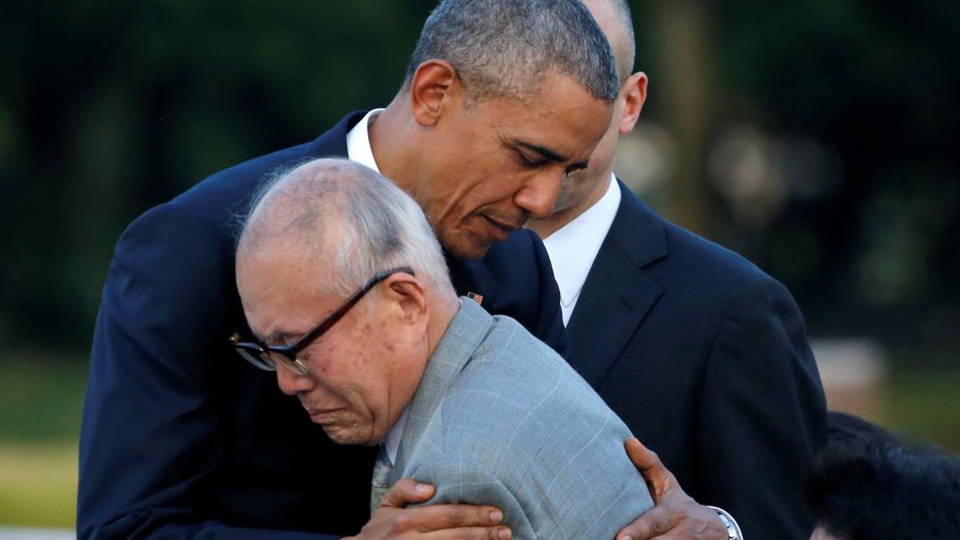
President Obama has become the first sitting U.S. president to visit the Japanese city of Hiroshima since U.S. warplanes dropped the first atomic bomb on August 6, 1945. The bomb killed 140,000 people and seriously injured another 100,000. Three days later, the U.S. dropped a second atomic bomb on Nagasaki, killing another 74,000 people. Obama spoke today at the Hiroshima Peace Memorial Park.
President Barack Obama: "Among those nations like my own that hold nuclear stockpiles, we must have the courage to escape the logic of fear and pursue a world without them. We may not realize this goal in my lifetime, but persistent effort can roll back the possibility of catastrophe."
Trump Secures Enough Delegates to Win Republican Nomination
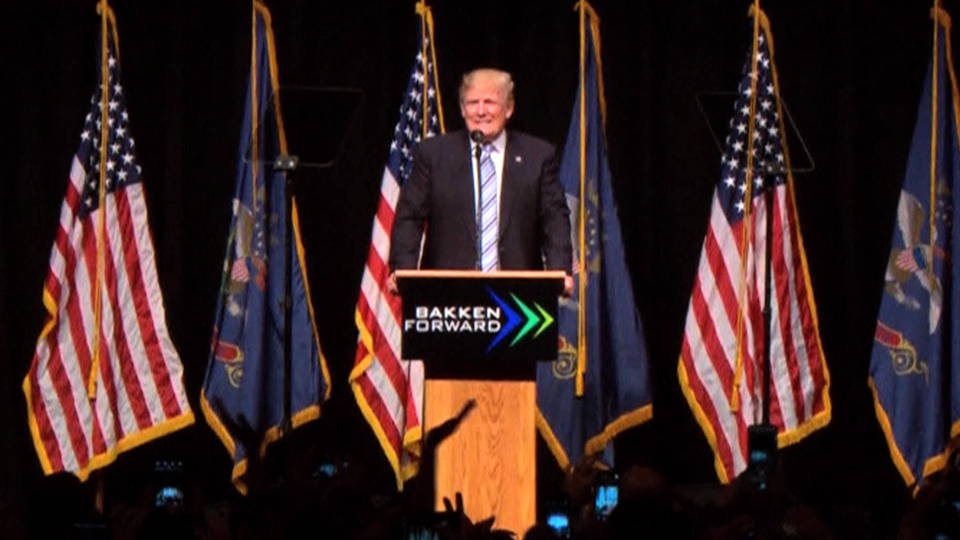
In news from the campaign trail, Donald Trump has officially secured the support of enough delegates to become the Republican Party nominee. Trump is now supported by 1,238 delegates—one delegate above the threshold required to clinch the nomination. He won’t become the party’s official nominee until the Republican National Convention in July. This comes as Trump spoke Thursday in North Dakota, where he pledged to push through the construction of the controversial Keystone XL pipeline. He also vowed to roll back the Paris climate accord.
Donald Trump: "We’re going to cancel the Paris climate agreement and stop—unbelievable—and stop all payments of the United States’ tax dollars to U.N. global warming programs."
Vince Foster's Sister Slams Trump for Reviving 1990s Conspiracy Theories
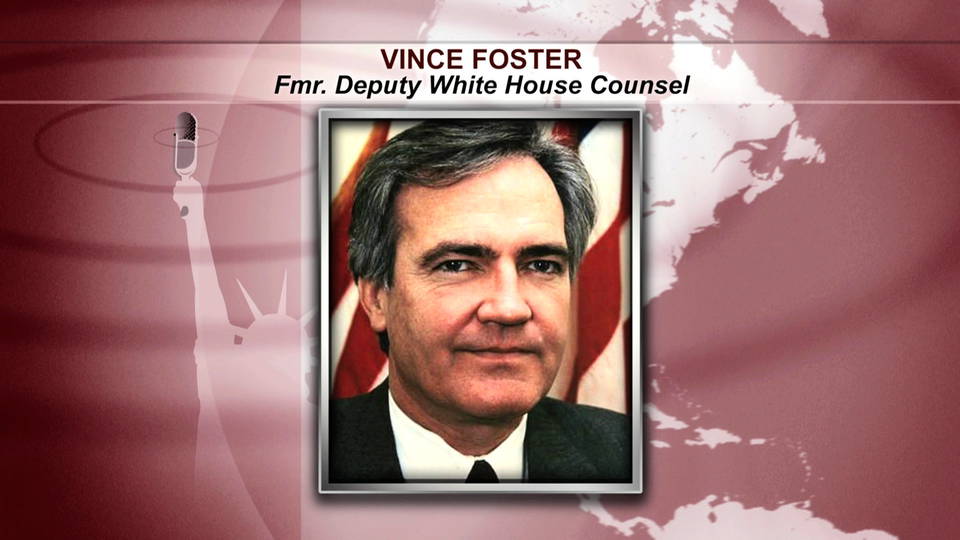
This comes as the sister of Vince Foster, a White House aide to President Bill Clinton who died in 1993, has written a scathing criticism of Donald Trump, after Trump revived conspiracy theories about Foster’s death earlier this week. Vince Foster committed suicide in 1993 after a struggle with depression. Yet, his death was the subject of multiple right-wing conspiracies at the time blaming Hillary Clinton for Foster’s death. Trump revived these theories in an interview with The Washington Post earlier this week, calling Foster’s death "very fishy." In an op-ed published by the Post Thursday, Sheila Foster Anthony called Trump’s comments "beyond contempt," writing, "This is scurrilous enough coming from right-wing political operatives ... How could this be coming from the presumptive Republican nominee for president?"
Trump Campaign Seeks to Dig Up 1990s Clinton Whitewater Scandal
This comes as the Trump campaign mistakenly copied a Politico reporter on an email to a Republican National Committee researcher asking him to "work up information on HRC/Whitewater as soon as possible." Whitewater refers to a scandal involving the Clintons’ real estate investments during the late 1970s. A Trump campaign spokeswoman mistakenly copied Politico reporter Marc Caputo, not Trump campaign adviser Michael Caputo, on the email.
Dems Consider Ousting Wasserman Schultz Ahead of DNC Convention
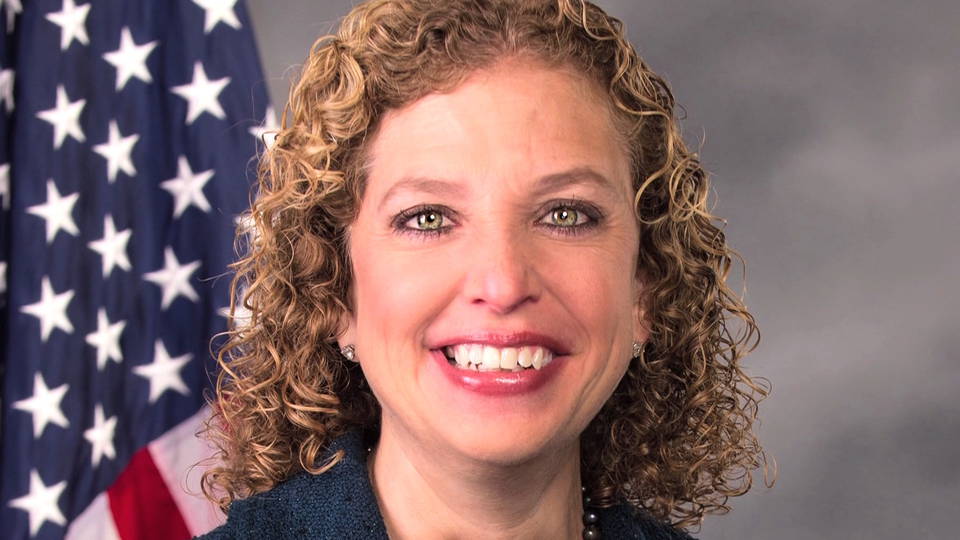
Meanwhile, Democrats are considering pressuring Democratic National Committee Chairwoman Debbie Wasserman Schultz to step down ahead of the national convention in July. Democratic presidential candidate Bernie Sanders has long accused Wasserman Schultz of being biased toward Hillary Clinton. This comes as Wasserman Schultz is in a tight race against progressive challenger Tim Canova for her own congressional seat in Florida. In an unusual move, Sanders has backed Canova.
Senators Warn New Bill Expands FBI Online Surveillance
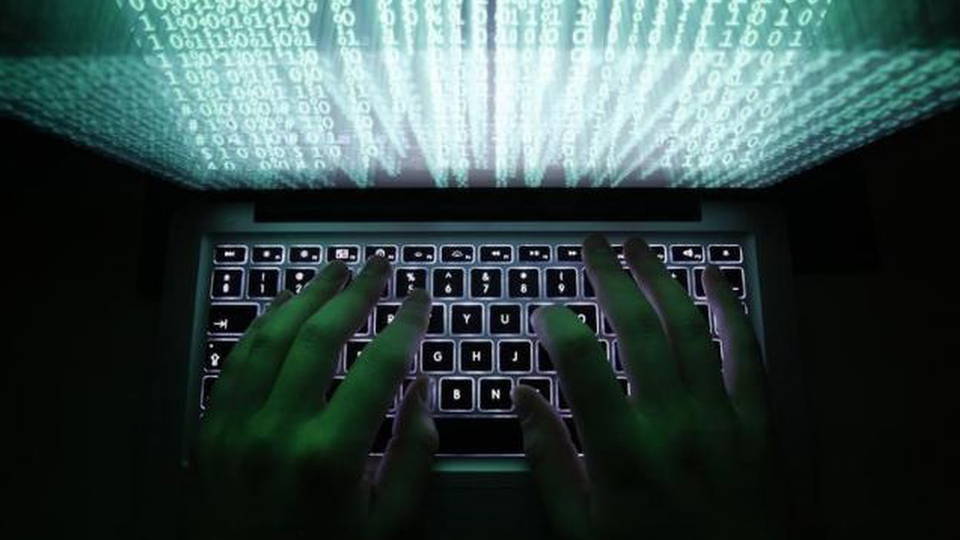
Two members of the Senate Intelligence Committee are warning that a new bill would expand the FBI’s ability to access Americans’ online records without a warrant. Oregon Senator Ron Wyden and New Mexico Senator Martin Heinrich say the 2017 intelligence authorization bill could allow the FBI to access email, chat and messaging records, as well as browser histories. On Thursday, Senator Heinrich called the bill a "massive expansion of government surveillance that lacks independent oversight."
Brazil: Interim Gov't to Lift Limits on Foreign Land Ownership
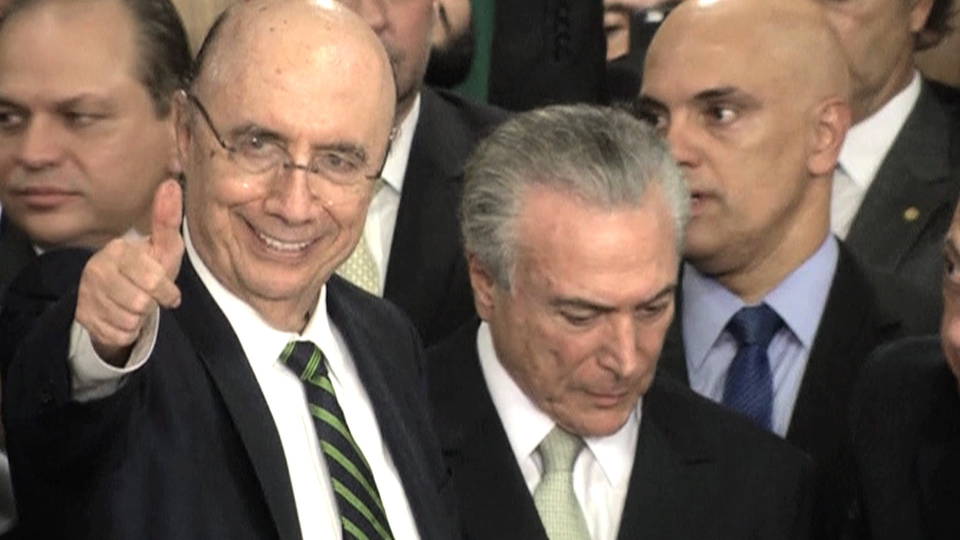
In Brazil, the interim government has announced plans to abandon the current limits on foreign land ownership, clearing the way for land grabs by multinational corporations. The interim government took power earlier this month after the Legislature voted to suspend President Dilma Rousseff and begin impeachment proceedings—a move that a growing number of residents and Latin American countries are calling a coup. This comes as Brazil’s powerful Landless Workers Movement, known as MST, has promised to launch a new wave of land occupations. Brazil already has vastly unequal land ownership, with 1 percent of the population owning nearly half of all the land.
Israeli Minister Resigns in Protest over Right-Wing Defense Minister
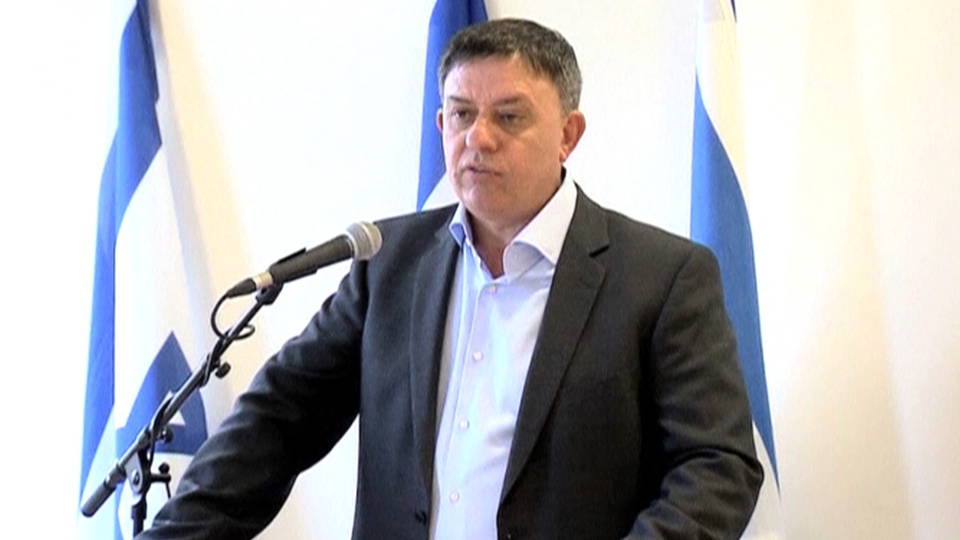
In Israel, the environment minister has resigned over the appointment of right-wing, ultranationalist politician Avigdor Lieberman as defense minister. Environmental Protection Minister Avi Gabbay announced his resignation.
Avi Gabbay: "I was unable to swallow the frog that landed this week, a year after I was appointed—the sacking of General Moshe 'Bogie' Ya’alon and appointment of Avigdor Lieberman as defense minister. This is, in my eyes, an extraordinary move even for the cynical world of politics."
Avigdor Lieberman is considered to be one of the most hawkish politicians in Israel.
WHO: Nearly 1,000 Killed in Hospital Attacks in 2 Years, Most Deliberate
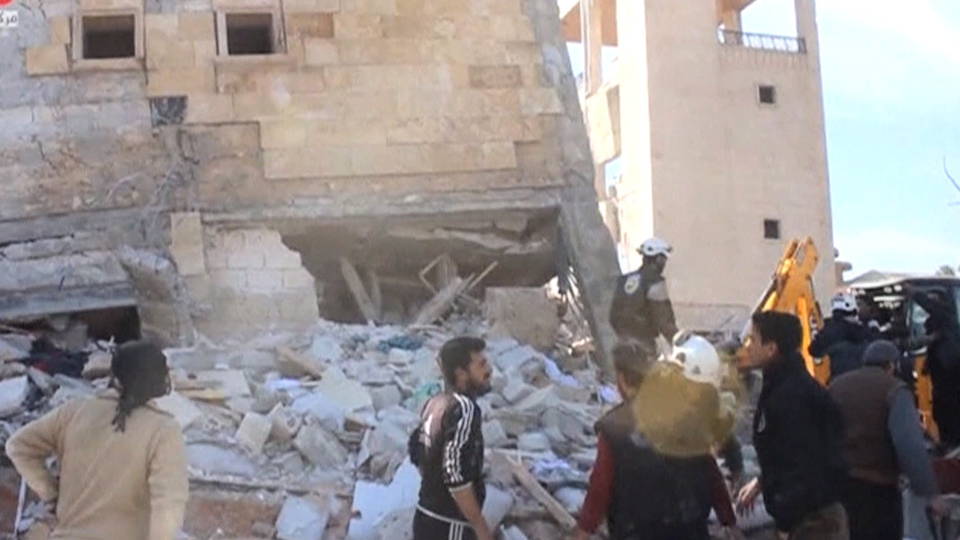
A new report by the World Health Organization has found nearly 1,000 people have been killed in attacks on hospitals and other healthcare facilities or workers over the last two years. Most strikingly, the report found more than 60 percent of these attacks were deliberate. The greatest number of attacks on hospitals and health providers were in Syria, where recent bombings of Doctors Without Borders-supported hospitals have sparked international protests.
Syria: U.N. Warns of Starvation If Assad Continues to Block Aid
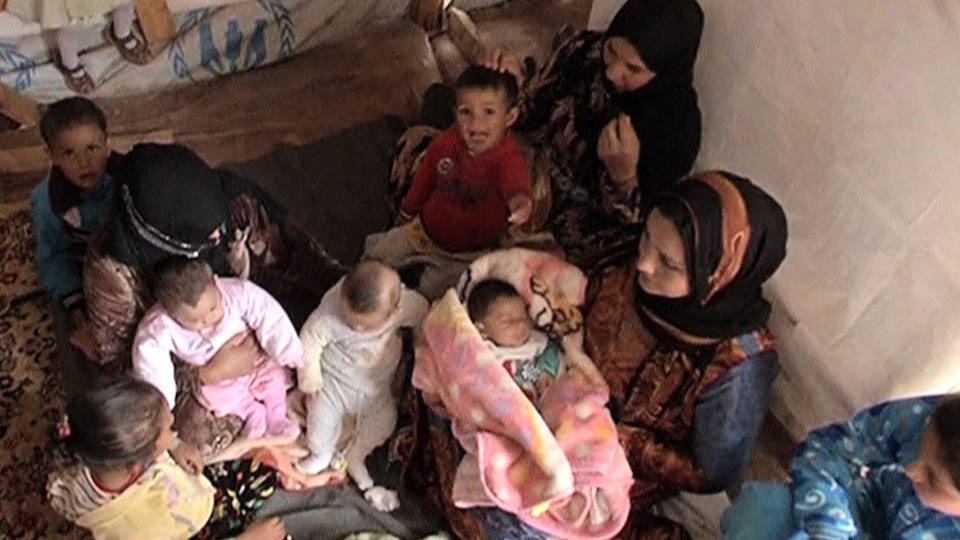
This comes as the United Nations is warning of the risk of starvation in government-besieged areas if the delivery of humanitarian aid continues to be blocked by the Assad regime. The United States, Russia and other countries have said they will begin airdropping aid by June 1 if the sieges are not lifted.
Mediterranean: 20 Refugees Drown & 4,000 Rescued in One Day
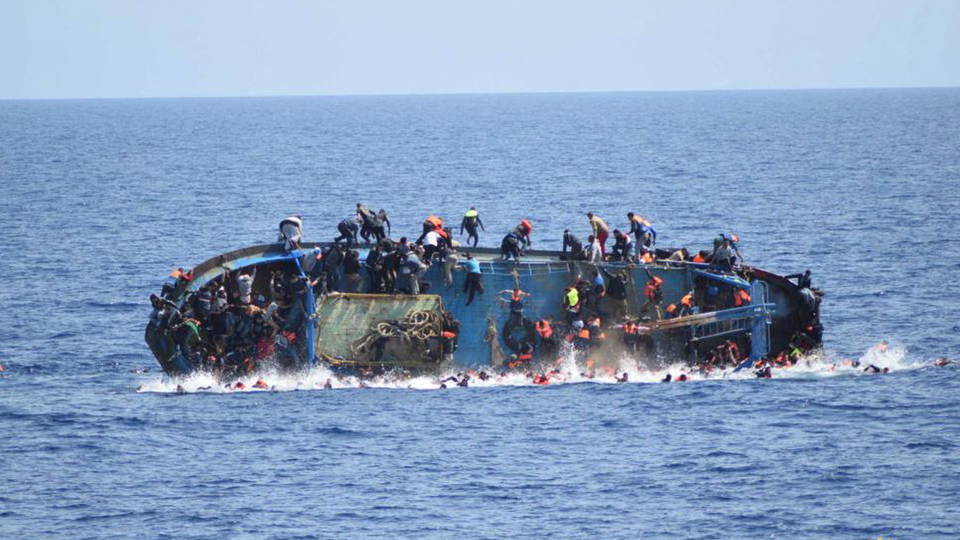
Meanwhile, the Italian coast guard says at least 20 people have drowned trying to cross the Mediterranean, while the coast guard rescued more than 4,000 additional people on Thursday. This comes as Greek officials have bulldozed the Idomeni refugee camp on the border near Macedonia. Authorities began forcibly removing thousands of refugees from the Idomeni camp earlier this week. The camp had been the site of frequent protests over Macedonia’s decision to close its border.
Mexican Military Kill Rate Raises Concerns of Summary Executions
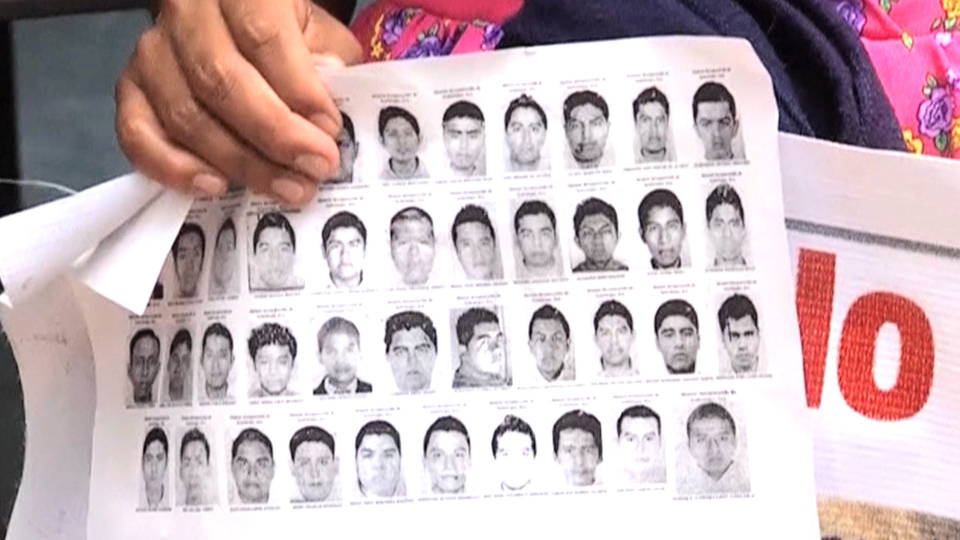
A new analysis of the Mexican military’s kill rate suggests the armed forces have engaged in summary killings and extrajudicial killings while waging the so-called war on drugs. The analysis is based on the government’s own figures. It shows the Mexican Army kills, rather than wounds, its enemies at a rate far higher than the average in modern warfare. The Mexican Armed Forces have also been accused of thousands of instances of torture, although only about a dozen cases have resulted in convictions since 2006. The analysis comes as the parents of the 43 missing Ayotzinapa Rural Teachers’ College students marched to mark the 20th month since their children disappeared on September 26, 2014. An independent investigation has found evidence the Mexican military was involved in their disappearance. Felipe de la Cruz, spokesperson for the parents of the missing students, spoke out.
Felipe de la Cruz: "We’ve come to remind the world that the Ayotzinapa case has not been resolved, and the Mexican government doesn’t want us to know the truth. Today we demand that the government accept the mechanism to continue the investigation, and for countries to witness the truth and allow for this mechanism."
Louisiana Passes "Blue Lives Matter" Law
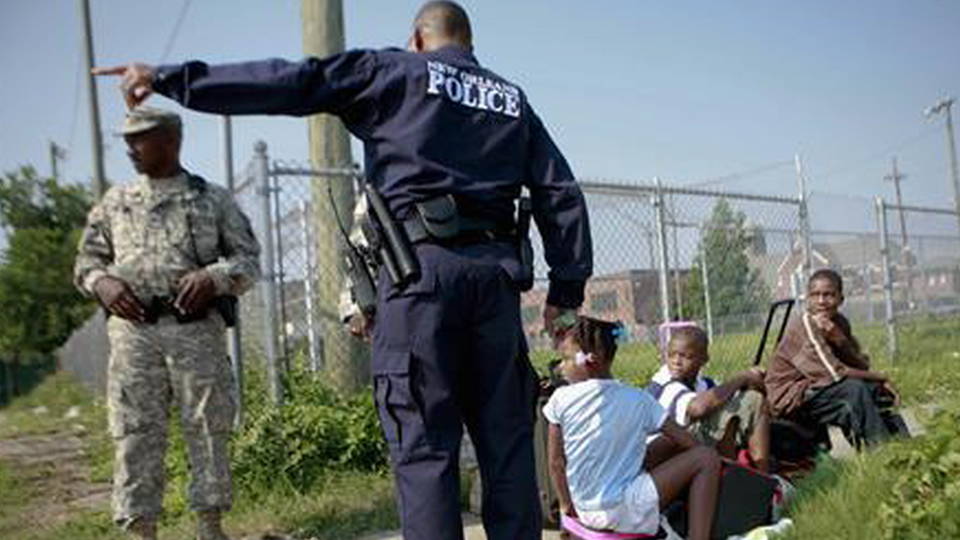
Louisiana Governor John Bel Edwards has signed a so-called Blue Lives Matter law, which expands the state’s hate crimes statute to add police officers, as well as firefighters and EMS personnel, to the list. The new law is the first of its kind in the country. Its signing sparked outrage by civil rights groups. Louisiana NAACPPresident Ernest Johnson said, "Hate crimes law is based upon a history of discrimination against certain groups of people, and a bill like this just tries to water down that reality, because there is not a history of discrimination against police and firefighters."
Lawsuit: NYPD Harassing and Targeting Homeless New Yorkers
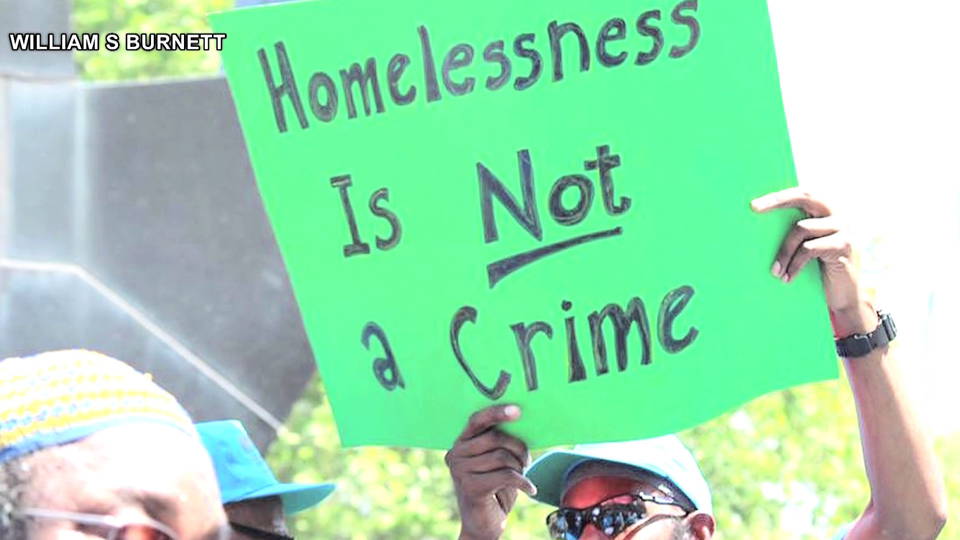
In New York, a new lawsuit accuses the New York Police Department of intentionally profiling and harassing people who live on the streets. The suit was filed by the ACLUand the group Picture the Homeless. It says the NYPD is engaging in discriminatory policing by targeting people who live on the streets with so-called "move along" orders, in which officers tell people sitting or standing on the sidewalk to go somewhere else, even though they have broken no laws.
Peace Activist and Holocaust Survivor Hedy Epstein Dies at 91
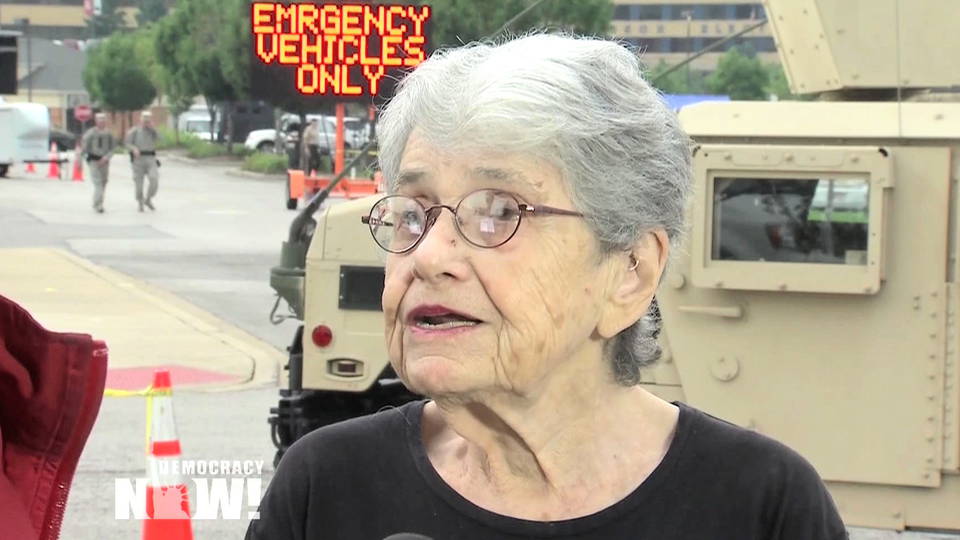
And Holocaust survivor and peace activist Hedy Epstein has died at the age of 91. Epstein was born in Germany and left in 1939 on a Kindertransport to England. Her parents died in Auschwitz. She later returned to Germany to work as a research analyst for the prosecution during the Nuremberg trials. She was involved in civil rights and antiwar movements throughout her life. In 2011, she was part of the Gaza Freedom Flotilla and was a passenger on the U.S.-flagged ship, The Audacity of Hope. In 2014, just days after her 90th birthday, she was arrested in St. Louis during a protest outside Missouri Governor Jay Nixon’s office over the police killing of unarmed African-American teenager Michael Brown. She spoke about her arrest on Democracy Now!
Hedy Epstein: "I know what it feels like to be discriminated against, to be oppressed, and I can’t stand idly by when I see there are problems. I can’t solve every problem, I probably can’t solve any problem, but I have to do whatever it is possible for me to do. I just cannot stand idly by, because if I did—and anyone that stand idly by becomes complicit in what is going on."
That was Hedy Epstein speaking on Democracy Now! in 2014. She died of cancer in her home in St. Louis on Thursday at the age of 91.
Donate today:
Follow:




SPEAKING EVENTS

Noam Chomsky on Obama's Visit to Hiroshima & More
207 West 25th Street, 11th Floor
New York, New York 10001, United States
---------------------
---------------------



No comments:
Post a Comment